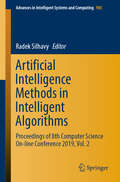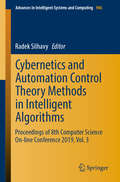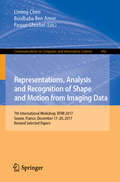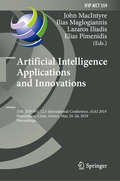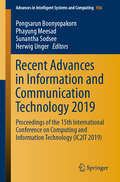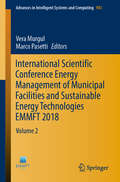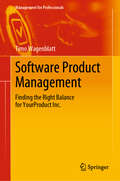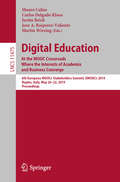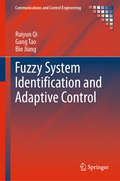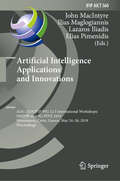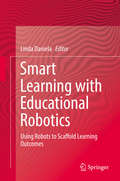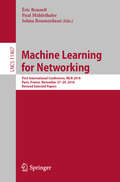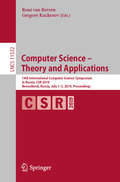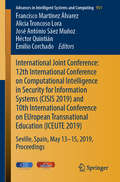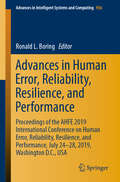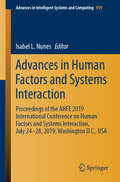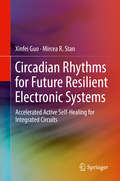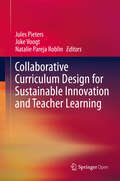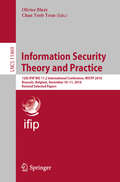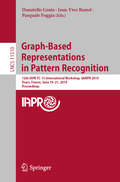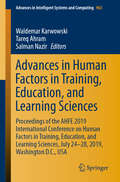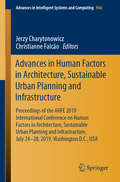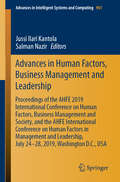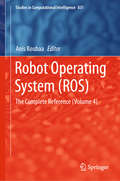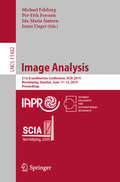- Table View
- List View
Artificial Intelligence Methods in Intelligent Algorithms: Proceedings of 8th Computer Science On-line Conference 2019, Vol. 2 (Advances in Intelligent Systems and Computing #985)
by Radek SilhavyThis book discusses the current trends in and applications of artificial intelligence research in intelligent systems. Including the proceedings of the Artificial Intelligence Methods in Intelligent Algorithms Section of the 8th Computer Science On-line Conference 2019 (CSOC 2019), held in April 2019, it features papers on neural networks algorithms, optimisation algorithms and real-world issues related to the application of artificial methods.
Cybernetics and Automation Control Theory Methods in Intelligent Algorithms: Proceedings of 8th Computer Science On-line Conference 2019, Vol. 3 (Advances in Intelligent Systems and Computing #986)
by Radek SilhavyThis book discusses novel intelligent-system algorithms and methods in cybernetics, presenting new approaches in the field of cybernetics and automation control theory. It constitutes the proceedings of the Cybernetics and Automation Control Theory Methods in Intelligent Algorithms Section of the 8th Computer Science On-line Conference 2019 (CSOC 2019), held on-line in April 2019.
Representations, Analysis and Recognition of Shape and Motion from Imaging Data: 7th International Workshop, RFMI 2017, Savoie, France, December 17–20, 2017, Revised Selected Papers (Communications in Computer and Information Science #842)
by Liming Chen Boulbaba Ben Amor Faouzi GhorbelThis book constitutes the refereed proceedings of the 7th International Workshop on Representations, Analysis and Recognition of Shape and Motion from Imaging Data, RFMI 2017, held in Savoi, France, in December 2017.The 8 revised full papers and 9 revised short papers presented were carefully reviewed and selected from 23 submissions. The papers are organized in topical sections on analyzing motion data; deep learning on image and shape data; 2D and 3D pattern classification; watermarking, segmentation and deformations.
Artificial Intelligence Applications and Innovations: 15th IFIP WG 12.5 International Conference, AIAI 2019, Hersonissos, Crete, Greece, May 24–26, 2019, Proceedings (IFIP Advances in Information and Communication Technology #559)
by John MacIntyre Ilias Maglogiannis Lazaros Iliadis Elias PimenidisThis book constitutes the refereed proceedings of the 15th IFIP WG 12.5 International Conference on Artificial Intelligence Applications and Innovations, AIAI 2019, held in Hersonissos, Crete, Greece, in May 2019.The 49 full papers and 6 short papers presented were carefully reviewed and selected from 101 submissions. They cover a broad range of topics such as deep learning ANN; genetic algorithms - optimization; constraints modeling; ANN training algorithms; social media intelligent modeling; text mining/machine translation; fuzzy modeling; biomedical and bioinformatics algorithms and systems; feature selection; emotion recognition; hybrid Intelligent models; classification - pattern recognition; intelligent security modeling; complex stochastic games; unsupervised machine learning; ANN in industry; intelligent clustering; convolutional and recurrent ANN; recommender systems; intelligent telecommunications modeling; and intelligent hybrid systems using Internet of Things. The papers are organized in the following topical sections:AI anomaly detection - active learning; autonomous vehicles - aerial vehicles; biomedical AI; classification - clustering; constraint programming - brain inspired modeling; deep learning - convolutional ANN; fuzzy modeling; learning automata - logic based reasoning; machine learning - natural language; multi agent - IoT; nature inspired flight and robot; control - machine vision; and recommendation systems.
Recent Advances in Information and Communication Technology 2019: Proceedings of the 15th International Conference on Computing and Information Technology (IC2IT 2019) (Advances in Intelligent Systems and Computing #936)
by Pongsarun Boonyopakorn Phayung Meesad Sunantha Sodsee Herwig UngerThis book presents the latest research on computer recognition systems. Over the last few years, computer scientists, engineers and users have been confronted with rapid changes in computer interfaces and in the abilities of the machines and the services available. And this is just the beginning: based on recent research findings, we can expect more significant advances and challenges in the next decade. Achievements in the area of artificial intelligence have made an important major contribution to these developments: Machine learning, natural language processing, speech recognition, image and video processing are just some of the major research and engineering directions that have made autonomous driving, language assistants, automatic translation and answering systems as well as other innovative applications such as more human-oriented interfaces possible. Those developments also reflect economic changes in the world, which are increasingly dominated by the needs of enhanced globalization, international cooperation (including its competitive aspects) and emerging global problems.
International Scientific Conference Energy Management of Municipal Facilities and Sustainable Energy Technologies EMMFT 2018: Volume 2 (Advances in Intelligent Systems and Computing #983)
by Vera Murgul Marco PasettiThis book presents a collection of the latest studies on and applications for the sustainable development of urban energy systems. Based on the 20th International Scientific Conference on Energy Management of Municipal Facilities and Sustainable Energy Technologies, held in Voronezh and Samara, Russia from 10 to 13 December 2018, it addresses a range of aspects including energy modelling, materials and applications in buildings; heating, ventilation and air conditioning systems; renewable energy technologies (photovoltaic, biomass, and wind energy); electrical energy storage; energy management; and life cycle assessment in urban systems and transportation.The book is intended for a broad readership: from policymakers tasked with evaluating and promoting key enabling technologies, efficiency policies and sustainable energy practices, to researchers and engineers involved in the design and analysis of complex systems.
Software Product Management: Finding the Right Balance for YourProduct Inc. (Management for Professionals)
by Timo WagenblattThis book is for product managers, product owners, product marketing managers, VPs and Heads of Product, CEOs, and start-up founders. In short, it serves anyone interested personally or professionally in software product management. You’ll learn how to plan, coordinate and execute all activities required for software product success. It enables you to find the right balance for delivering customer value and long-term product success.The book offers a comprehensive introduction for beginners as well as proven practices and a novel, holistic approach for experienced product managers. It provides much-needed clarity regarding the numerous tasks and responsibilities involved in the professional and successful management of software products. Readers can use this book as a reference book if they are interested in or have the urgent need to improve one of the following software product management dimensions: Product Viability, Product Development, Go-to-Market / Product Marketing, Software Demonstrations and Training, The Market / Your Customers, or Organizational Maturity.The book helps product people to maximize their impact and effectiveness. Whether you’re a seasoned practitioner, new to software product management, or just want to learn more about the best-of-all disciplines and advance your skills, this book introduces a novel and “business” tested approach to structure and orchestrate the vital dimensions of software product management. You will learn how to create focus and alignment on the things that matter for product success.The book describes a holistic framework to keep the details that matter for product success in balance, taking into consideration the limiting factors, strategies and responsibilities that determine the overall product yield potential. It explains how to leverage and adapt the framework with regard to aspects like product viability, product development, product marketing and software demonstrations and training, as well as more general aspects like markets, customers and organizational maturity.The book focuses on the unique challenges of software product managers or any related roles, whether you are a founder of a small to mid-sized software company or working in the complex ecosystems of large software enterprises or corporate IT departments.
Digital Education: 6th European MOOCs Stakeholders Summit, EMOOCs 2019, Naples, Italy, May 20–22, 2019, Proceedings (Lecture Notes in Computer Science #11475)
by Mauro Calise Carlos Delgado Kloos Justin Reich Jose A. Ruiperez-Valiente Martin WirsingThis book constitutes the proceedings of the 6th European Conference on Massive Open Online Courses, EMOOCs 2019, held in Naples, Italy, in May 2019. The 15 full and 6 short papers presented in this volume were carefully reviewed and selected from 42 submissions. Massive Open Online Courses (MOOCs) have marked a milestone in the use of technology for education. The reach, potential, and possibilities of EMOOCs are immense. But they are not only restricted to global outreach: the same technology can be used to improve teaching on campus and training inside companies and institutions. The chapter 'Goal Setting and Striving in MOOCs. A Peek inside the Black Box of Learner Behaviour' is open access under a CC BY 4.0 license at link.springer.com.
Fuzzy System Identification and Adaptive Control (Communications and Control Engineering)
by Ruiyun Qi Gang Tao Bin JiangThis book provides readers with a systematic and unified framework for identification and adaptive control of Takagi–Sugeno (T–S) fuzzy systems. Its design techniques help readers applying these powerful tools to solve challenging nonlinear control problems. The book embodies a systematic study of fuzzy system identification and control problems, using T–S fuzzy system tools for both function approximation and feedback control of nonlinear systems. Alongside this framework, the book also: introduces basic concepts of fuzzy sets, logic and inference system; discusses important properties of T–S fuzzy systems; develops offline and online identification algorithms for T–S fuzzy systems; investigates the various controller structures and corresponding design conditions for adaptive control of continuous-time T–S fuzzy systems; develops adaptive control algorithms for discrete-time input–output form T–S fuzzy systems with much relaxed design conditions, and discrete-time state-space T–S fuzzy systems; and designs stable parameter-adaptation algorithms for both linearly and nonlinearly parameterized T–S fuzzy systems. The authors address adaptive fault compensation problems for T–S fuzzy systems subject to actuator faults. They cover a broad spectrum of related technical topics and to develop a substantial set of adaptive nonlinear system control tools. Fuzzy System Identification and Adaptive Control helps engineers in the mechanical, electrical and aerospace fields, to solve complex control design problems. The book can be used as a reference for researchers and academics in nonlinear, intelligent, adaptive and fault-tolerant control.
Artificial Intelligence Applications and Innovations: AIAI 2019 IFIP WG 12.5 International Workshops: MHDW and 5G-PINE 2019, Hersonissos, Crete, Greece, May 24–26, 2019, Proceedings (IFIP Advances in Information and Communication Technology #560)
by John MacIntyre Ilias Maglogiannis Lazaros Iliadis Elias PimenidisThis book constitutes the refereed proceedings of two International Workshops held as parallel events of the 15th IFIP WG 12.5 International Conference on Artificial Intelligence Applications and Innovations, AIAI 2019, in Hersonissos, Crete, Greece, in May 2019: the 8th Mining Humanistic Data Workshop, MHDW 2019, and the 4th Workshop on 5G-Putting Intelligence to the Network Edge, 5G-PINE 2019.The 6 full papers and 4 short papers presented at MHDW 2019 were carefully reviewed and selected from 13 submissions; out of the 14 papers submitted to 5G-PINE 2019, 6 were accepted as full papers and 1 as short paper. The MHDW papers focus on the application of innovative as well as existing data matching, fusion and mining and knowledge discovery and management techniques (such as decision rules, decision trees, association rules, ontologies and alignments, clustering, filtering, learning, classifier systems, neural networks, support vector machines, preprocessing, post processing, feature selection, visualization techniques) to data derived from all areas of humanistic sciences, e.g., linguistic, historical, behavioral, psychological, artistic, musical, educational, social, and ubiquitous computing and bioinformatics. The papers presented at 5G-PINE focus on several innovative findings coming directly from modern European research in the area of modern 5G telecommunications infrastructures and related innovative services and cover a wide variety of technical and business aspects promoting options for growth and development.
Smart Learning with Educational Robotics: Using Robots to Scaffold Learning Outcomes
by Linda DanielaThis book will offer ideas on how robots can be used as teachers' assistants to scaffold learning outcomes, where the robot is a learning agent in self-directed learning who can contribute to the development of key competences for today's world through targeted learning - such as engineering thinking, math, physics, computational thinking, etc. starting from pre-school and continuing to a higher education level. Robotization is speeding up at the moment in a variety of dimensions, both through the automation of work, by performing intellectual duties, and by providing support for people in everyday situations. There is increasing political attention, especially in Europe, on educational systems not being able to keep up with such emerging technologies, and efforts to rectify this. This edited volume responds to this attention, and seeks to explore which pedagogical and educational concepts should be included in the learning process so that the use of robots is meaningful from the point of view of knowledge construction, and so that it is safe from the technological and cybersecurity perspective.
Machine Learning for Networking: First International Conference, MLN 2018, Paris, France, November 27–29, 2018, Revised Selected Papers (Lecture Notes in Computer Science #11407)
by Éric Renault Paul Mühlethaler Selma BoumerdassiThis book constitutes the thoroughly refereed proceedings of the First International Conference on Machine Learning for Networking, MLN 2018, held in Paris, France, in November 2018. The 22 revised full papers included in the volume were carefully reviewed and selected from 48 submissions. They present new trends in the following topics: Deep and reinforcement learning; Pattern recognition and classification for networks; Machine learning for network slicing optimization, 5G system, user behavior prediction, multimedia, IoT, security and protection; Optimization and new innovative machine learning methods; Performance analysis of machine learning algorithms; Experimental evaluations of machine learning; Data mining in heterogeneous networks; Distributed and decentralized machine learning algorithms; Intelligent cloud-support communications, resource allocation, energy-aware/green communications, software defined networks, cooperative networks, positioning and navigation systems, wireless communications, wireless sensor networks, underwater sensor networks.
Computer Science – Theory and Applications: 14th International Computer Science Symposium in Russia, CSR 2019, Novosibirsk, Russia, July 1–5, 2019, Proceedings (Lecture Notes in Computer Science #11532)
by René Van Bevern Gregory KucherovThis book constitutes the proceedings of the 14th International Computer Science Symposium in Russia, CSR 2019, held in Novosibirsk, Russia, in July 2019. The 31 full papers were carefully reviewed and selected from 71 submissions. The papers cover a wide range of topics such as algorithms and data structures; computational complexity; randomness in computing; approximation algorithms; combinatorial optimization; constraint satisfaction; computational geometry; formal languages and automata; codes and cryptography; combinatorics in computer science; applications of logic to computer science; proof complexity; fundamentals of machine learning; and theoretical aspects of big data.
International Joint Conference: Seville, Spain, May 13th-15th, 2019 Proceedings (Advances in Intelligent Systems and Computing #951)
by Francisco Martínez Álvarez Alicia Troncoso Lora José António Sáez Muñoz Héctor Quintián Emilio CorchadoThis volume presents papers presented at CISIS 2019 and ICEUTE 2019, held in the beautiful and historic city of Seville (Spain) in May 2019.The 12th CISIS 2019 conference offered a meeting opportunity for academic and industry-related researchers form the various communities of computational intelligence, information security and data mining, and the need for intelligent, flexible behaviour by large, complex systems, especially in mission-critical domains, was the catalyst and the aggregation stimulus for the event. The book covers current topics such as cryptographic and data analytics solutions to fulfil least minimum privilege and endorse least minimum effort in information systems. The book also includes 15 papers from the 10th ICEUTE 2019, covering topics like new approaches to assess competencies and innovation in computer science education.
Advances in Human Error, Reliability, Resilience, and Performance: Proceedings of the AHFE 2019 International Conference on Human Error, Reliability, Resilience, and Performance, July 24-28, 2019, Washington D.C., USA (Advances in Intelligent Systems and Computing #956)
by Ronald L. BoringThis book brings together studies broadly addressing human error from different disciplines and perspectives. It discusses topics such as human performance; human variability and reliability analysis; medical, driver and pilot error, as well as automation error; root cause analyses; and the cognitive modeling of human error. In addition, it highlights cutting-edge applications in safety management, defense, security, transportation, process controls, and medicine, as well as more traditional fields of application. Based on the AHFE 2019 International Conference on Human Error, Reliability, Resilience, and Performance, held on July 24-28, 2019, Washington D.C., USA, the book includes experimental papers, original reviews, and reports on case studies, as well as meta-analyses, technical guidelines, best practice and methodological papers. It offers a timely reference guide for researchers and practitioners dealing with human error in a diverse range of fields.
Advances in Human Factors and Systems Interaction: Proceedings of the AHFE 2019 International Conference on Human Factors and Systems Interaction, July 24-28, 2019, Washington D.C., USA (Advances in Intelligent Systems and Computing #959)
by Isabel L. NunesThis book reports on cutting-edge research into innovative system interfaces, highlighting both lifecycle development and human–technology interaction, especially in virtual, augmented and mixed-reality systems. It describes advanced methodologies and tools for evaluating and improving interface usability and discusses new models, as well as case studies and good practices. The book addresses the human, hardware, and software factors in the process of developing interfaces for optimizing total system performance, while minimizing their costs. It also highlights the forces currently shaping the nature of computing and systems, such as: the importance of portability and technologies for reducing power requirements; the necessity of a better assimilation of computation in the environment; as well as solutions to promote accessibility to computers and systems for people with special needs. The book, which is based on the AHFE 2019 International Conference on Human Factors and Systems Interaction, held on July 24-28, 2019, in Washington D.C., USA, offers a timely survey and practice-oriented guide for systems interface users and developers alike.
Circadian Rhythms for Future Resilient Electronic Systems: Accelerated Active Self-Healing for Integrated Circuits
by Xinfei Guo Mircea R. StanThis book describes methods to address wearout/aging degradations in electronic chips and systems, caused by several physical mechanisms at the device level. The authors introduce a novel technique called accelerated active self-healing, which fixes wearout issues by enabling accelerated recovery. Coverage includes recovery theory, experimental results, implementations and applications, across multiple nodes ranging from planar, FD-SOI to FinFET, based on both foundry provided models and predictive models. Presents novel techniques, tested with experiments on real hardware;Discusses circuit and system level wearout recovery implementations, many of these designs are portable and friendly to the standard design flow;Provides circuit-architecture-system infrastructures that enable the accelerated self-healing for future resilient systems;Discusses wearout issues at both transistor and interconnect level, providing solutions that apply to both;Includes coverage of resilient aspects of emerging applications such as IoT.
Collaborative Curriculum Design for Sustainable Innovation and Teacher Learning
by Joke Voogt Jules Pieters Natalie Pareja RoblinThis open access book provides insight into what it takes to actively involve teachers in the curriculum design process. It examines different aspects of teacher involvement in collaborative curriculum design, with specific attention to its implications for sustainable curriculum innovation and teacher learning. Divided into six sections, the book starts out by introducing the notion of collaborative curriculum design and discusses its historical and theoretical foundations. It describes various approaches commonly adopted to actively involve teachers in the (co-)design of curriculum materials. Sections two and three provide examples of what key phases in the curriculum design process - such as needs analysis, design and development, and implementation - look like across various collaborative curriculum design projects. Section four reports on the impact of collaborative curriculum design on student learning, teacher practices, teacher professional growth, and institutional change. Building on the research evidence about the outcomes of collaborative curriculum design, section five focuses on sustainability, scaling-up and curriculum leadership issues, which are key to the continuation and further evolution of curriculum innovations. Future perspectives are addressed in section six with emphasis on the infrastructure of a sustainable curriculum innovation.
Information Security Theory and Practice: 12th IFIP WG 11.2 International Conference, WISTP 2018, Brussels, Belgium, December 10–11, 2018, Revised Selected Papers (Lecture Notes in Computer Science #11469)
by Olivier Blazy Chan Yeob YeunThis volume constitutes the refereed proceedings of the 12th IFIP WG 11.2 International Conference on Information Security Theory and Practices, WISTP 2018, held in Brussels, Belgium, in December 2018. The 13 revised full papers and 2 short papers presented were carefully reviewed and selected from 45 submissions. The papers are organized in the following topical sections: real world; cryptography; artificial learning; cybersecurity; and Internet of things.
Graph-Based Representations in Pattern Recognition: 12th IAPR-TC-15 International Workshop, GbRPR 2019, Tours, France, June 19–21, 2019, Proceedings (Lecture Notes in Computer Science #11510)
by Donatello Conte Jean-Yves Ramel Pasquale FoggiaThis book constitutes the refereed proceedings of the 12th IAPR-TC-15 International Workshop on Graph-Based Representation in Pattern Recognition, GbRPR 2019, held in Tours, France, in June 2019.The 22 full papers included in this volume together with an invited talk were carefully reviewed and selected from 28 submissions. The papers discuss research results and applications at the intersection of pattern recognition, image analysis, and graph theory. They cover topics such as graph edit distance, graph matching, machine learning for graph problems, network and graph embedding, spectral graph problems, and parallel algorithms for graph problems.
Advances in Human Factors in Training, Education, and Learning Sciences: Proceedings of the AHFE 2019 International Conference on Human Factors in Training, Education, and Learning Sciences, July 24-28, 2019, Washington D.C., USA (Advances in Intelligent Systems and Computing #963)
by Waldemar Karwowski Tareq Ahram Salman NazirThis book focuses on the importance of human factors in optimizing the learning and training process. It reports on the latest research and best practices and discusses key principles of behavioral and cognitive science, which are extremely relevant to the design of instructional content and new technologies to support mobile and multimedia learning, virtual training and web-based learning, among others, as well as performance measurements, social and adaptive learning and many other types of educational technologies, with a special emphasis on those important in the corporate, higher education, and military training contexts. Based on the AHFE 2019 Conference on Human Factors in Training, Education, and Learning Sciences, held on July 24-28, 2019, in Washington D.C., USA, the book offers a timely perspective on the role of human factors in education. It highlights important new ideas and will fosters new discussions on how to optimally design learning experiences.
Advances in Human Factors in Architecture, Sustainable Urban Planning and Infrastructure: Proceedings of the AHFE 2019 International Conference on Human Factors in Architecture, Sustainable Urban Planning and Infrastructure, July 24-28, 2019, Washington D.C., USA (Advances in Intelligent Systems and Computing #966)
by Jerzy Charytonowicz Christianne FalcãoThis book discusses human factors research directed towards realizing and assessing sustainability in the built environment and architecture. It reports on advanced engineering methods for sustainable infrastructure design, architecture as well as on assessments of the efficient methods and the social, environmental, and economic impact of various designs and projects. The book covers a range of topics, including the use of recycled materials in architecture, ergonomics in buildings and public design, sustainable design for smart cities, design for the aging population, industrial design, human scale in architecture, and many more. Based on the AHFE 2019 International Conference on Human Factors in Architecture, Sustainable Urban Planning and Infrastructure, held on July 24-28, 2019, in Washington D.C., USA, it offers various perspectives on sustainability and ergonomics. As such, it is a valuable reference resource for designers, urban engineers, architects, infrastructure professionals, public infrastructure owners, policy makers, government engineers and planners, as well as operations managers and academics active in urban and infrastructure research.
Advances in Human Factors, Business Management and Leadership: Proceedings Of The Ahfe 2017 Conference On Human Factors, Business Management And Society And The Ahfe 2017 Conference On Human Factors In Management And Leadership, July 17-21, 2017, Los Angeles, California, Usa (Advances in Intelligent Systems and Computing #594)
by Jussi Ilari Kantola Salman NazirThis book presents practical approaches for facilitating the achievement of excellence in the management and leadership of organizational resources. It shows how the principles of creating shared value can be applied to ensure faster learning, training, business development, and social renewal. In particular, it presents novel methods and tools for tackling the complexity of management and learning in both business organizations and society. Discussing ontologies, intelligent management systems, methods for creating knowledge and value added, it offers novel insights into time management and operations optimization, as well as advanced methods for evaluating customers’ satisfaction and conscious experience. Based on two conferences, the AHFE 2019 International Conference on Human Factors, Business Management and Society, and the AHFE 2019 International Conference on Human Factors in Management and Leadership, held in July 24-28, 2019, Washington D.C., USA, the book provides both researchers and professionals with new tools and inspiring ideas for achieving excellence in various business activities.
Robot Operating System: The Complete Reference (Volume 4) (Studies in Computational Intelligence #831)
by Anis KoubaaThis is the fourth volume of the successful series Robot Operating Systems: The Complete Reference, providing a comprehensive overview of robot operating systems (ROS), which is currently the main development framework for robotics applications, as well as the latest trends and contributed systems. The book is divided into four parts: Part 1 features two papers on navigation, discussing SLAM and path planning. Part 2 focuses on the integration of ROS into quadcopters and their control. Part 3 then discusses two emerging applications for robotics: cloud robotics, and video stabilization. Part 4 presents tools developed for ROS; the first is a practical alternative to the roslaunch system, and the second is related to penetration testing. This book is a valuable resource for ROS users and wanting to learn more about ROS capabilities and features.
Image Analysis: 21st Scandinavian Conference, SCIA 2019, Norrköping, Sweden, June 11–13, 2019, Proceedings (Lecture Notes in Computer Science #11482)
by Michael Felsberg Per-Erik Forssén Ida-Maria Sintorn Jonas UngerThis volume constitutes the refereed proceedings of the 21st Scandinavian Conference on Image Analysis, SCIA 2019, held in Norrköping, Sweden, in June 2019. The 40 revised papers presented were carefully reviewed and selected from 63 submissions. The contributions are structured in topical sections on Deep convolutional neural networks; Feature extraction and image analysis; Matching, tracking and geometry; and Medical and biomedical image analysis.
